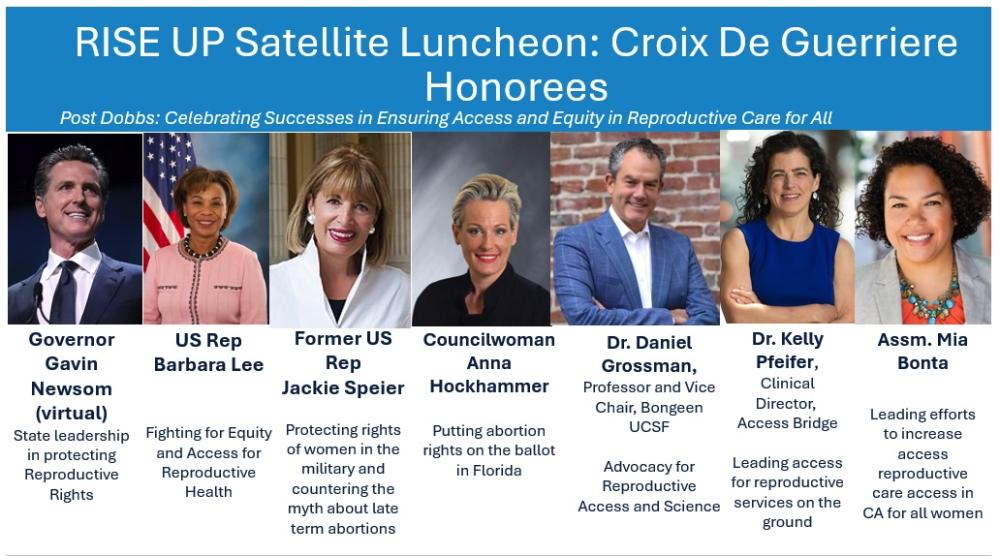
Dr. Laura Esserman addresses attendees at the opening session of the RISE UP Breast Cancer Symposium in San Francisco.
Last month, experts from across the globe met in San Francisco for the RISE UP Breast Cancer Symposium, a new, interdisciplinary conference focusing on a bold reimagining of breast cancer prevention and treatment through cross-disciplinary exchange of ideas and out-of-the-box thinking.
Held at the Nikko Hotel in San Francisco, the symposium spanned three days and brought together more than 300 researchers and physicians across multiple disciplines to discuss strategies to reduce mortality against the disease.
Recent political and legal challenges to reproductive health care and its impact on cancer research and care providers was a catalyst for this event. Speakers discussed how decreased access to medications typically used for contraception significantly constrains breast cancer research, as well as disease prevention and treatment recommendations.
Friday, November 1st
- The role of tumor classification in optimizing therapy and outcomes
- Imaging as a predictive biomarker in clinical trials early endpoint
- Increasing efficacy while decreasing toxicity of local and systemic therapy
- Poster Session: Tumor classifiers, imaging endpoints, toxicity reduction
Saturday, November 2, 2024
- Risk Prediction and Biomarkers for Prevention Trials
- Applying the lessons of breast cancer biology to prevention
- Poster Session: Prevention studies in progress, Turnaway study, etc.
- The Consequences of the Dobbs decision: a look at the impact in women’s health
- Panel: Breast Cancer and Maternal Mortality Disparities in African American Women: Connection or Coincidence?
- Equitable Access: Tackling Barriers in Clinical Trial Diversity
- Poster Session: Environmental exposures, novel prevention strategies, risk prediction, risk factors
Sunday, November 3, 2024
- Poster Session: Cycle Control, Post-partum weaning, menopause control, modifiable risk factors, I2I Entries
- Lecture: The Science of the Sex Hormone Ecosystem Across a Woman's Lifespan
- Postpartum Breast Cancer: Opportunities for Improving Treatment and Prevention
- Making Prevention and Holistic Care a Priority in Women’s Health
- Ideas to Implementation: Incorporating Breast Cancer Prevention into a Holistic Approach to Women's Health
Conference co-founder Dr. Laura Esserman, who co-leads the Breast Oncology Program at the UCSF Helen Diller Family Comprehensive Cancer Center (HDFCCC), said medications like mifepristone could be "game changing" in terms of reducing breast cancer risk but have been limited amid states’ restrictions on abortions following the 2022 Supreme Court Dobbs ruling.
"Other hormones — such as fetal estrogen, a steroid hormone used in fetal development — could potentially reduce breast cancer risk, as could other forms of contraception," Esserman said.
A luncheon and panel discussion, including California Governor Gavin Newsom and US Rep. Barbara Lee, doubled as fundraiser to encourage innovative research. Per the program, funds would be used to support efforts to rethink and reformulate medications used for hormonal manipulation throughout the course of a woman’s lifetime, and redesign them with a goal of reducing the incidence of breast cancer.

Dr. Kim Rhoads, Associate Director of Community Engagement at the HDFCCC, co-chaired a session on improving equitable access to clinical trials. She stressed the importance of public policy in broadening access to trials.
"It was particularly interesting to hear about some of the legislative solutions in particular, SB 37 in California, which is the National Clinical Trials Coverage Act, which broadens the options for people with Medi-Cal to access clinical trials across the state of California at comprehensive cancer centers, where they have a better opportunity of actually getting into a trial for the disease and specific conditions that they're facing," Rhoads added.
Panelists for this session included the founders of Lazarex Cancer Foundation and Tigerlily Foundation, patient-advocacy organizations that address structural barriers which inhibit patient participation. Expanding equitable access to trials lies in partnering with these groups, Rhoads added.
The symposium concluded with a quick pitch session on "Ideas to Implementation: Incorporating Breastancer Prevention into a Holistic Approach to Women’s Health," judged by Susie Brain of the UCSF Breast Science Advocacy Core. Organizers hope to expand the conference in the coming years.
Additional Thoughts from Session Presenters
Media Coverage
- Organizers say SF breast cancer summit carries added significance | SF Examiner
- Lasofoxifene Suppresses Ki-67 Expression in HR+/HER2– Early-Stage Breast Cancer | OncLive
- Sermonix Surveys Find Vaginal/Sexual Health Symptoms Are Among Most Significant Issues Affecting Lives of ER+/HER2- Metastatic Breast Cancer Patients | Global News Wire
- Havah Therapeutics to Present Real World Data at the RiseUp for Breast Cancer Conference | Business News Wire